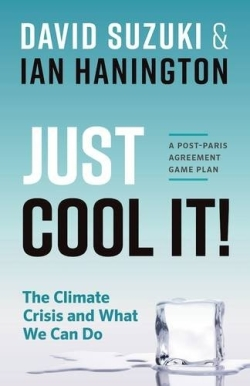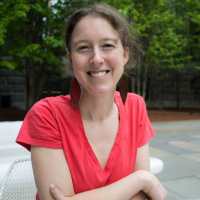Climate Change: What's the Post-Paris Game Plan? Renowned Author Has Advice

Now that President Trump has announced he will pull out of the Paris Agreement on climate change, this recently released book is taking on new relevance. Just Cool It! The Climate Crisis and What We Can Do—A Post-Paris Agreement Game Plan (Greystone Books)—reviewed here by Anna Call—opens with a pressing question: “The 2015 Paris Agreement on climate change showed that the world is finally taking global warming seriously. Is it too little too late, or is there still hope for humanity?”
This is the latest of co-author David Suzuki’s more than fifty books; a renowned scientist-communicator, he has been awarded the UNESCO’s Kalinga Prize for the Popularization of Science. Co-author Ian Hanington is senior editor for the David Suzuki Foundation. Hanington offered some insight into the inspiration and strategy for this “Post-Paris Agreement Game Plan.”
What were your main goals for this book?

Part of what David Suzuki and I wanted to do was to write something that was easy to read, easy to understand, but fairly comprehensive. Anyone could pick it up, and if they read it they’d have a pretty clear understanding of climate change science itself, the history behind it, why we’ve failed to address it the way we should, and what we should be doing about it or could be doing about it.
The primary focus had to be on solutions. At least two-thirds of the book had to be about solutions. That is the most important element of the discussion.
I think there are some amazing things that are being developed, like using biomimicry to create solar power or battery storage, using artificial photosynthesis. [We’re] looking at people who really are moving the dial forward, people like Elon Musk at Tesla and others who are developing solutions that are really innovative and really interesting.
I guess both the frustration and the joy of writing about this is just looking at the potential we have with some of these technologies, not just in terms of confronting pollution and climate change, but in terms of economic development. Instead of just digging up oil and burning it, there are all of these things being invented by really smart people with really good ideas.
Who is your primary audience, and how do you hope readers will engage with the topic?
[The book is] aimed at anyone who really wants to get a clear understanding of the big picture, of the entire subject of climate change. We’re really hoping that it has some broad appeal.
It’s not the easiest subject to read about. It can be a little bit disturbing and depressing to really examine what’s going on. But I think the more people who at least have a realistic picture of what’s happening, the better position we’ll be in to address climate change.
We’re also helping people assess the sources. The book goes into some detail about that— some of the sources that are not credible, which I think is quite a big thing, especially these days in what is being labeled the “post-truth era” or the “era of fake news.” There is just so much information out there, and a lot of it is false. There are a lot of really popular sites that are focused on climate change denial, and I think making people aware of those sites, what their agenda is and where their funding comes from [is important].
I hope that somebody who picks up this book would get a fairly good understanding of the science and also of how to evaluate different positions that are put across in stuff they might read.
I imagine that one challenge for this project was figuring out how to account for the complexity and also to make it an organized and readable text. Did you encounter that and find ways to address that?
It’s definitely a challenge. I think that to me is why I like the section on the history of the science. A lot of that was stuff that I didn’t know before I started reading about it, and that to me is where we get an overall picture of how these carbon cycles and hydrologic cycles, ocean currents, massive global systems, all work and interact.
Why is this book important now?
We’re at a particularly challenging time right now. The US has an administration that is full of climate change deniers and anti-environmentalists. It’s a really challenging time. There are some huge barriers, and it’s coming at a time when we really don’t have time to lose. I think it’s a crisis that needs to be addressed right now. When you have arguably the most powerful nation on Earth electing a government that doesn’t even believe that there’s a problem, that’s an issue, and that’s a huge challenge.
There’s a petition that was [recently] sent to President Donald Trump from 300 so-called eminent scientists and experts, although there aren’t really many scientists and experts on that petition, saying that we actually need to burn more coal, put more CO2 in the atmosphere.
It’s such an absurd and unscientific argument that I do take some pleasure in being able to debunk that, rallying the real scientists and using their information to debunk it. Of course, I’m not a scientist myself, so I’m drawing from other people who do have more expertise than I do.
Your co-author, David Suzuki, writes in the preface: “If we summon the human ingenuity and intelligence that have propelled us as a species, this can become a time of great opportunity. But we must act now.” Do writing and reading count as action?
I think it’s really important the more people we have writing about these issues and trying to cut through the pollution or the noise to present rational arguments and to really focus on what we need to be doing, rather than getting bogged down in arguments about whether climate change exists. It clearly does, and clearly, humans are a major, major contributor to it.

Emily Avery-Miller is a writer and teacher in Boston. Her prose and reviews have appeared in Bird’s Thumb, Literary Bohemian, Art New England and others. @EBAverymiller
Emily Avery-Miller
